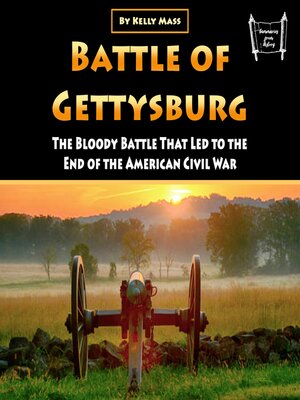Battle of Gettysburg
audiobook (Unabridged) ∣ The Bloody Battle That Led to the End of the American Civil War
By Kelly Mass

Sign up to save your library
With an OverDrive account, you can save your favorite libraries for at-a-glance information about availability. Find out more about OverDrive accounts.
Find this title in Libby, the library reading app by OverDrive.



Search for a digital library with this title
Title found at these libraries:
| Library Name | Distance |
|---|---|
| Loading... |
This audiobook is narrated by a digital voice.
The summer of 1863 found the Confederate Army of Northern Virginia at the pinnacle of its power and confidence. Fresh from their stunning victory at Chancellorsville in May, where Robert E. Lee and Stonewall Jackson had outmaneuvered and defeated a Union army twice their size, the Southern forces seemed invincible. However, the victory had come at a terrible cost with the death of Jackson, Lee's most trusted lieutenant, who fell to friendly fire in the confusion of a night attack. Despite this grievous loss, Lee was determined to capitalize on Confederate momentum and carry the war into Northern territory.
The strategic situation in the spring of 1863 had reached a critical juncture for the Confederacy. While Lee's army had achieved remarkable success in Virginia, the broader war picture was less encouraging for Southern hopes. In the west, Ulysses S. Grant was tightening his grip around Vicksburg, the Confederate fortress city controlling the Mississippi River. The Union naval blockade was strangling Southern commerce and industry, while the North's superior industrial capacity and manpower were beginning to tell. Lee understood that time was working against the Confederacy and that bold action was needed to break the strategic deadlock.
The idea of invading Pennsylvania appealed to Lee for multiple reasons beyond mere military considerations. A successful campaign on Northern soil could potentially shift European opinion toward recognizing Confederate independence, particularly if it resulted in a decisive battlefield victory. Such recognition might bring diplomatic intervention and force the Lincoln administration to negotiate a peace settlement. Additionally, an invasion would relieve the war-ravaged Virginia countryside during the crucial summer growing season, allowing farmers to tend their crops without the presence of opposing armies consuming their resources.







